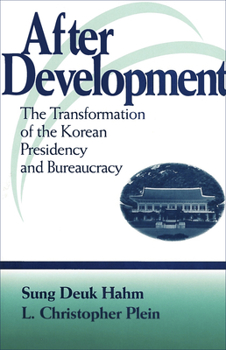After Development: The Transformation of the Korean Presidency and Bureaucracy
This book explores the dynamic changes now taking place in the South Korean government as a result of recent social and economic liberalization. Sung Deuk Hahm and L. Christopher Plein trace the emergence in Korea of a post-developmental state, in which both increasingly autonomous capital interests and growing public expectations of a higher quality of life challenge existing authoritarian institutions. Separating out the constituent parts of the...
Format:Paperback
Language:English
ISBN:0878406603
ISBN13:9780878406609
Release Date:July 1997
Publisher:Georgetown University Press
Length:224 Pages
Weight:0.68 lbs.
Dimensions:0.5" x 5.9" x 8.9"
Grade Range:Postsecondary and higher
Customer Reviews
3 ratings
Excellent Commentary and Analysis
Published by Thriftbooks.com User , 24 years ago
Although being Korean, but having been brought up in the states, I was never interested nor aware of all the politics and the bureaucracy intertwined in Korea. However, the authors depth and insights were truly mind awakening. I now have a better understanding and historical overview of the transitonal changes undergoing in Korea. A must read for my third generation Korean-American children.
A book with valuable insights
Published by Thriftbooks.com User , 26 years ago
Choice magazine said about this book: The authors study South Korea's transition from the authoritarian to the postdevelopmental state through both institutions (the presidency and the bureaucracy) and policy (technology development and transfer). Hahm (Korea Univ.) and Plein (West Virginia Univ.) challenge the existing developmental model, which assumes the monolithic power of bureaucracy, and they focus on the Korean presidency, finding that broader social, historical, and economic effects are undermining the ability of the state (primarily the president) to formulate development policy and that the influences of the state vis-avis economic actors is in decline. A weakness is the limitation to technology policy: the applicability of the conclusions to other policy areas is uncertain. Paradoxically, while the authors criticize the developmental model as emphasizing the power of the bureaucracy, their conclusions indicate the declining power of the presidency (which must act as broker among competing private interests and public actors) and the growing influence of the bureaucracy. It remains to be seen whether these conclusions will hold in the post-Kim era. In sum, this book offers valuable insights into the dynamic changes in Korea in particular and to the transition of a developmental state in general.
Startling discovery, one of a kind.
Published by Thriftbooks.com User , 26 years ago
Excellent theoretical overview of the political situation and history of the South Korean economy. This book reveals that the true source of success of the Korean economy is the President, not the bureaucracy. Furthermore, this book did an in-depth analysis of foreign direct investment and technology licensing in Korea.






